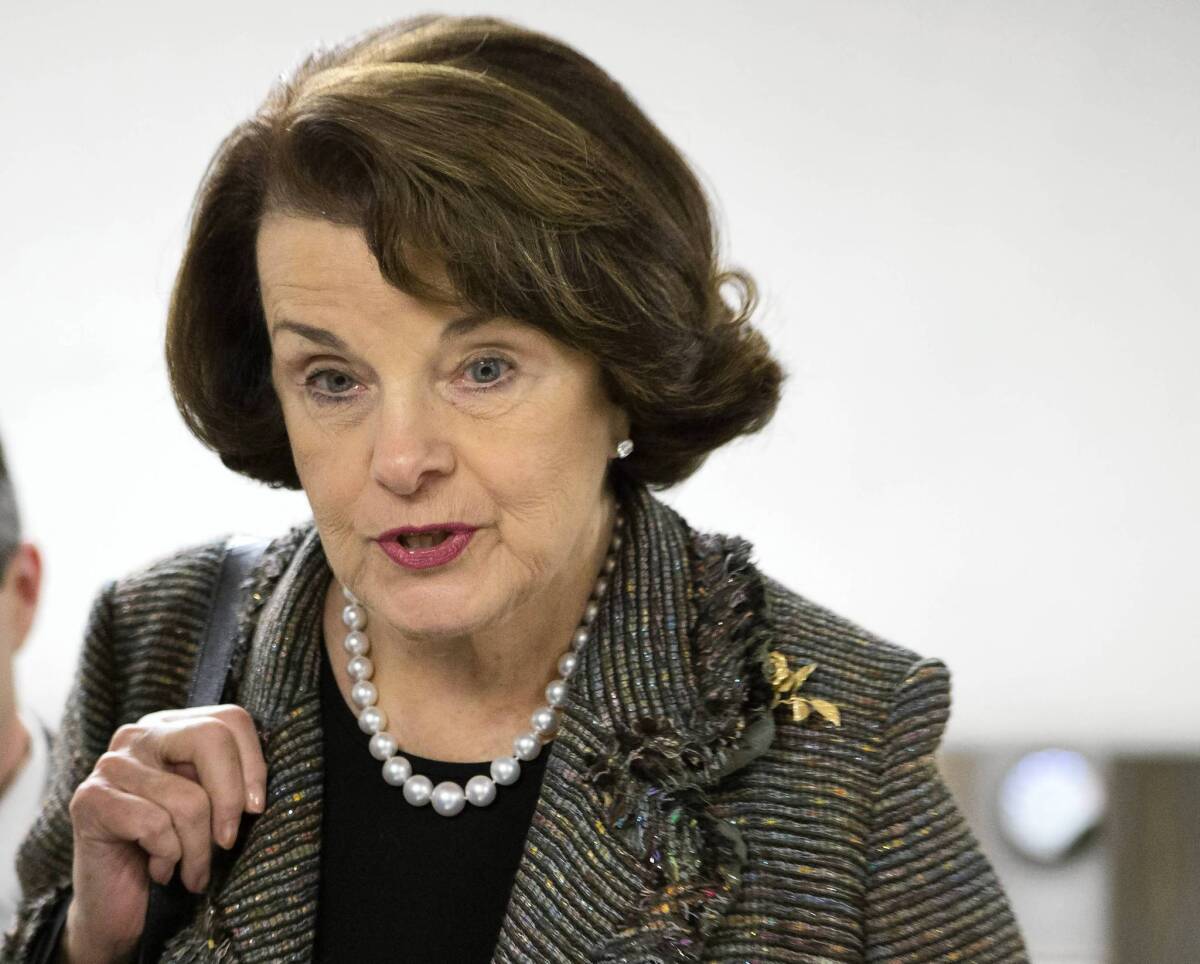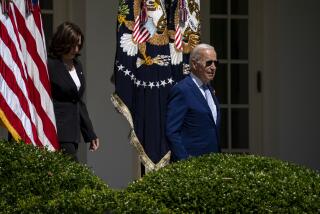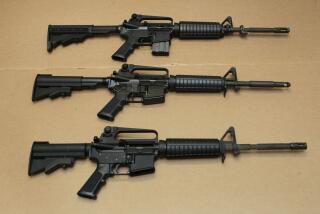Feinstein’s assault weapons ban loses this round

WASHINGTON — To advance a cause that has defined her political career, Sen. Dianne Feinstein brought the father of a child killed at Sandy Hook Elementary School to Capitol Hill, where he talked about the last time he saw his first-grader alive. She brought in police officers to press her case against her law-and-order opponents.
She made it personal, evoking the time she had sought a pulse on the wrist of San Francisco Supervisor Harvey Milk, shot seconds before, and found her fingers “in a bullet hole.” And she erupted in a rare display of public anger when a Republican senator questioned her understanding of the Constitution.
But on Tuesday, none of that was enough as the Senate majority leader, a fellow Democrat, excluded Feinstein’s proposed assault weapons ban from a broader gun package. Nevada Sen. Harry Reid said he made the move out of fear the Feinstein ban would jeopardize the passage of more popular measures.
“I’m not going to try to put something on the floor that won’t succeed,” Reid said.
That was the unofficial death knell, and brought Feinstein to a place she has been before. She suffered similar disappointment in 2004, when Congress allowed her 1994 assault weapons ban to expire.
The California senator would not publicly acknowledge defeat, vowing to continue to lobby colleagues as she brings the ban up as an amendment to the broader bill. She said she would also seek a vote to ban ammunition magazines that can accept more than 10 rounds.
“Obviously I’m disappointed,” she said. “I tried my best, but my best, I guess, wasn’t good enough.”
But there was a tinge of irritation as well. Citing public support for an assault weapons ban, she said, “You’d think the Congress would listen, but they clearly listen to the National Rifle Assn.”
Feinstein’s measure would prohibit the sale, import and manufacture of more than 150 weapons — including the make of Bushmaster rifle used in the Newtown, Conn., school shooting — and also ban the larger ammunition magazines. People who legally own assault weapons — 3.5 million to 4 million such guns exist, by one estimate — would be allowed to keep them. To buy one of the existing weapons, buyers would have to undergo a background check.
Gun violence has propelled Feinstein’s political career. She became San Francisco mayor after Mayor George Moscone and Milk were shot to death at City Hall in 1978.
She pushed for the 1994 ban after a series of shootings, including a 1993 rampage in a San Francisco office building that left eight people dead and six wounded. She has become a favorite nemesis of the NRA, which has used her visage to raise money.
This time around, she spent weeks working to rally support for a new ban in the belief that the December school massacre would turn the debate. She pushed back against the notion that assault weapons should be allowed for hunting.
“Who is going to respect the hunter with a 30-round clip and an assault weapon going after a deer?” she asked at a recent hearing.
Republicans questioned whether the 1994 ban reduced gun violence, and contended that the new proposal would jeopardize the rights of law-abiding citizens. They called instead for better enforcement of existing gun laws and stronger efforts to keep guns away from people with mental illnesses.
In making his decision and risking Feinstein’s wrath, Reid was attempting to remove an impediment to passage of more widely supported measures that expand background checks for gun purchases, crack down on gun trafficking and fund school safety improvements. All are seen as more likely to win passage.
He said the assault weapons measure was likely to win fewer than 40 votes in the 100-member chamber, well short of the 60 needed to overcome a filibuster. His count underscored Feinstein’s struggle to line up support from rural-state Democrats, some of whom are up for reelection next year.
“Banning assault weapons was always a long shot,” said Adam Winkler, a UCLA law professor and author of “Gunfight: The Battle Over the Right to Bear Arms in America.” “Gun control advocates will be disappointed, but dropping Sen. Feinstein’s proposal may make it easier for the other proposals, like background checks, to gain passage.”
Still, Reid’s decision was a personal blow to Feinstein. She has regarded the 1994 law as one of her signature achievements. The pen President Clinton used to sign the measure hangs prominently in her office.
“She’s faced tough odds before,” said Mark Kadesh, a former Feinstein chief of staff. “She fights the fight because she’s always fought the fight.... She’s surprised people in the past. Even if unsuccessful, sometimes you have to fight the fight because you know it’s the right thing to do.”
It was that sentiment Feinstein sought to reinforce Tuesday.
“In my heart of hearts, I never thought that this would be anything but hard,” she said in an interview in which she vowed to press on. “If it’s not this time, it will be another time. Does it dim my ardor? Absolutely not.”
And she spoke grimly as a veteran of the gun wars.
“There will be another event,” she said. “Mark my words.”
Melanie Mason and Michael A. Memoli in the Washington bureau contributed to this report.
More to Read
Start your day right
Sign up for Essential California for news, features and recommendations from the L.A. Times and beyond in your inbox six days a week.
You may occasionally receive promotional content from the Los Angeles Times.







